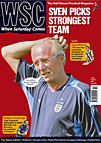 How do you buy votes if you are a club chairman in Buenos Aires? Hire Maradona and try to avoid falling out with your star striker, as Martin Gambarotta explains
How do you buy votes if you are a club chairman in Buenos Aires? Hire Maradona and try to avoid falling out with your star striker, as Martin Gambarotta explains
That football and politics mix in Argentina is nothing new. But rarely has there been such an explicit case than the recent events at Boca Juniors. Mauricio Macri, the club’s millionaire president who runs his own centre-right party, is running for the lower house of congress in Buenos Aires in the election scheduled for October.
Macri, club president since 1995, has turned Boca Juniors into a trophy-winning machine – the club picked up three out of four Copa Libertadores between 2000 and 2003, their best-ever run in South America’s top club competition. To give the club, and thereby his campaign, a boost before the mid-term elections, Macri recently hired Diego Maradona, now boasting he is clean from drugs, to run the club’s football department. But not everything has run smoothly for Macri.
Boca lost the Libertadores final last year and won no local titles. The only joy in 2004 came when forward Marcelo Delgado, who had just rejoined the club after a stint in Mexico, rifled the winner from a free-kick against arch-rivals River Plate. And even with Boca at the top, Macri has not has not had an easy political ride. Boca won the Libertadores in 2003 but Macri, the son of a wealthy business tycoon who has faced corruption allegations in the past, lost the mayoral election in Buenos Aires in the run-off against the incumbent mayor, a liberal who had been endorsed by President Néstor Kirchner, who is very popular. But the current mayor’s career has been ruined by a nightclub fire in December 2004 that killed 194 – meaning that Buenos Aires is up for grabs once again and Macri is in with a chance of winning the election.
When Boca went on a pre-season tour of Asia in August, Delgado, now 32, received an offer from a Japanese club and told Macri he wanted to leave. Macri insisted that he must see out his two-year contract. A paper photographed the pair looking grim in a Seoul hotel lobby. Then Delgado blew his top. “Macri,” Delgado said, “should manage the club. He shouldn’t do personal business with Boca. Here the most important thing is Boca.” The implication was that Macri usually takes a cut and that with this potential transfer, reportedly the work of middlemen not linked to Macri, that would not be the case. That’s not the kind of talk a congressional candidate wants to hear in an election year in a country where corruption is thought to be rampant.
Delgado was suspended and sent back to Buenos Aires. But before leaving Seoul the Boca squad had one last training session. Delgado and Macri, who likes to play, were in the same team. Delgado, according to the press, “did not pass the ball to Macri”. The story alternated between the political and sports sections of the papers. Foreign Minister Rafael Bielsa, the president’s congressional candidate in Buenos Aires, said he would be very embarrassed if accused of “having shady deals in my office”. Bielsa, a lawyer who treats Macri like a rich kid with no brains on a political joyride, is the brother of Marcelo Bielsa, the former Argentina coach who reportedly recently turned down an offer to manage Boca.
By then Macri was calling the affair “purely political”, saying Bielsa had the support of a faction at Boca headed by a Peronist who was once on his side. The Peronists, currently in power, are basically pragmatic populists with strong links to the trade unions and can be of the left, right or centre. Traditionally, Boca have been seen as a Peronist club but the connection is largely symbolic – the Boca neighbourhood itself does not generally give Peronists a majority of their votes.
Maradona, who had got on the wrong side of the squad when he cautioned them that they would collect bonuses “when they win”, had no real say in the scandal and eventually spoke his mind on radio. “You can’t,” Maradona said, “prevent Delgado making a fortune at his age.” Delgado apologised after arriving home. “But what is said is said,” he added, which did not sound like a full retraction. He was suspended for 23 days without pay and will stay at Boca.
One paper reported that the scandal cost Macri a drop of four percentage points in the polls. Other players were also talking. Jorge Bermudez, the Colombia sweeper who captained Boca in 2001, said Macri treated players as “objects to gain from economically”. Macri said Bermudez, who was eventually kicked out of the club, was a “bad person telling lies to discredit me”. More cryptically Macri, who has now taken leave of absence to dedicate himself fully to the campaign, said the case may also have been the work “of people who want me to stay for more years at Boca”.
From WSC 224 October 2005. What was happening this month